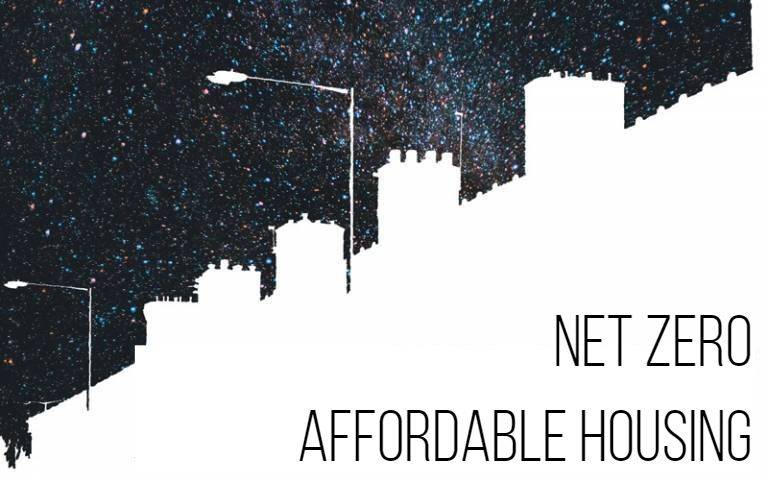We are pleased to announce two hybrid virtual conferences coming up in June 2021 on the pertinent topic of Net Zero and Affordable Housing.
A collaborative project between University College London and KTH Stockholm.
Funded by UCL Cities Partnership Programme.
The political and societal support towards reducing carbon emissions has considerably increased over the last couple of years and energy used in buildings has some of the highest CO2 emissions across all sectors. The energy used in residential buildings contributes to 11% of total emissions, at par with that from road transport.
In April 2021, the UK government announced that it will set the world’s most ambitious climate change target into law to reduce emissions by 78% by 2035 compared to 1990 levels. The UK has also adopted a net zero emissions target by 2050. The City of Stockholm sets the goals to be a fossil free and climate positive city by 2040 and to reduce greenhouse gas emissions to a maximum of 1.5 tonnes of CO2e per inhabitant by 2023.
Improving the energy efficiency of existing and new buildings is therefore becoming more so important and a constructive dialogue needs to be established how those targets can be achieved in the housing sector not compromising the affordability of housing and considering the needs of the residents and the local community. Sweden is seen as a leader in net zero housing as well as a country which has been successfully tackling housing unaffordability. The virtual symposiums below aim to bring together researchers, leading practitioners and policy makers to discuss the way forward towards Net Zero Affordable Housing in Sweden and the UK and learn from best practices in those countries.
Organisers:
Dr Stanimira Milcheva - Associate Professor, UCL
Bertram Steininger - Associate Professor, KTH
Programme
Towards Net Zero Affordable Housing – The Swedish Perspective
Monday 14th June 2021 - 14:00 - 16:00 (all times are BST)
*REGISTRATION FOR THIS EVENT IS NOW CLOSED*
14:00 - 14.05
Opening Remarks (Dr Bertram Steininger, KTH)
14:05 - 14:30
- Pro-environmental behaviour in the built environment, Elena Malakhatka (KTH, Live-in Lab)
KTH Live-In Lab enables testing of products, services and methods in real buildings, which results in a well-founded basis for changing structures and rules, and increased use of new innovative technology. Tests in KTH Live-In Lab lead to accelerated innovation.
Source and further information: link, video
14:30 - 14:55
- “Stockholm Royal Seaport”, Christina Salmhofer (City of Stockholm, Sustainability Strategist)
The Stockholm Royal Seaport is the largest urban development area in Sweden, with 12,000 new homes and 35,000 workplaces. The Stockholm City Council decided that Royal Seaport would be designated an area with an environmental profile with the mandate to determine what is possible in the current situation and push the boundaries where possible, to become a model of sustainable urban development.
Source and further information: link, video
15:00 - 15:25
- The major urban redevelopment in central Stockholm “Hammarby Sjöstad 2.0”, Jörgen Lööf (ElectriCITY Innovation, CEO)
ElectriCITY is a citizenship-driven innovation platform which aims to create a climate neutral city district by 2030. We set climate goals at the district level – “twice as fast improvement as the one in Stockholm city” – to drive on and help Stockholm succeed in reaching the goal of becoming a fossil-free city in 2040.
Source and further information: link, video
15:30 - 16:00
Panel discussion
Chair: Bertram Steininger
- Elena Malakhatka (KTH, Live-in Lab)
- Christina Salmhofer (City of Stockholm, Sustainability Strategist)
- Jörgen Lööf (ElectriCITY Innovation, CEO)
Towards Net Zero Affordable Housing - The UK Perspective
Wednesday 23rd June - 12:00 - 14:00 (all times are BST)
Register here for the UK Event
12:00 - 12:05
Opening Remarks (Dr Stanimira Milcheva, UCL)
12:05 - 12:20
- Keynote Speech by Emma Harvey (Green Finance Institute, Programme Director)
Emma joined the Green Finance Institute in 2019 and leads a portfolio of coalitions and projects including the Coalition for the Energy Efficiency of Buildings, an industry-led collaboration with more than 200 individual members, focused on developing new financial products and solutions to help accelerate the decarbonisation of buildings. Emma previously worked within Barclays Bank championing the green finance agenda, supporting the bank’s first green bond issuance and pioneering Barclays green home mortgage.
The Green Finance Institute was established in 2019 as a direct response to a key policy recommendation made by the industry-led Green Finance Taskforce to the UK Government in March 2018. Sitting at the nexus of the public and private sectors, the Green Finance Institute convenes and leads sectoral coalitions of global experts, that identify and unlock barriers to investment towards impactful, real-economy outcomes, to benefit our environment, society, and business. The Institute is an independent, commercially focused organisation backed by government and led by bankers, which focuses on designing, developing and launching portfolios of scalable financial solutions that accelerate sector-specific transitions to a low-carbon future.
12:20 - 12:55
Findings from research on the net zero housing transition
- Paul Ruyssevelt (UCL) Assessing energy efficiency in housing in England
Many local authorities and social housing providers have set ambitious deadlines to get to net zero carbon emissions from the energy used in their housing stocks. To deliver on these ambitions, assessments are required of the options, constraints, costs and benefits for the routes to net zero. Historically, such assessments have been conducted in a theoretical manner using archetype homes to which standard sets of retrofit measures are applied and these are then scaled-up to represent the population of the housing stock. Such assessments miss important factors that apply to individual homes, resulting in highly uncertain outputs. This presentation will provide a brief overview of a new approach in which 3D geo-spatial digital information, assembled from a variety of available datasets, can be used to analyse the options, constraints, costs and benefits for each individual home and automatically bring these together to examine the routes to net zero for the whole stock with much higher levels of confidence.
The work presented builds on the development of the 3DStock model by the UCL Building Stock Lab (BSL) which has been used to create the London Building Stock Model (LBSM), the London Solar Opportunity Map (LSOM) and the Be Seen new development reporting portal for the Greater London Authority.
12:55 - 14:00
Industry panel discussion: The way ahead for net zero affordable housing in the UK?
Chair: Stanimira Milcheva
- Helen Collins (Savills, UK Board – Affordable Housing)
Helen specialises in advising with affordable housing providers, investors and developers on growth and investment strategies. She leads Savills Affordable Housing Consultancy business and sits on the UK Board.
- Peter Denton (Hyde Housing, CEO)
Peter is Chief Executive Officer at the Hyde Group a large UK housing association managing 50,000 homes and over 100,000 customers. He also has 27 years of pan European real estate sector involvement covering a broad range of strategic leadership roles and over £20bn of investment, asset management, joint venture, capital markets, treasury and fundraising experience. Peter moved from the Starwood Capital Group where, as a Partner for five years, he managed the firms Special Situations and Credit investing businesses in Europe as well as creating and being the fund manager for Europe's largest publicly traded real estate finance company. Prior to this Peter held senior EMEA real estate investment banking roles at BNP Paribas, Barclays, Deutsche Bank, Eurohypo and WestImmo. Peter is also a non-executive Real Estate IC member for Eurazeo, the Global Investment Company.
- Pete Gladwell (L&G, Head Public Sector Partnerships)
Pete joined Legal & General in August 2007, with responsibility for the design and development of new funds and overseeing relationships with pension funds and investment consultants. He led on the creation of a new generation of property funds particularly focussed on liability matching and Defined Contributions pension funds and L&G’s joint ventures with Dutch pension funds, which now total over £5 billion. In 2013, Pete was appointed Head of Public Sector Partnerships, to lead L&G's direct investments across property and infrastructure into partnerships with Local and Combined Authorities, Registered Providers, Universities, the NHS, and central government, including the Cabinet Office. These investments total over £5.35bn.
- Paul Hackett (Optivo, Chief Executive)
Paul is CEO of Optivo, one of the UK’s leading housing associations. Paul is a former chair of G15, representing London’s largest housing associations and a former member of the Homes for Londoners Board. Paul is an Honorary Professor at the UCL Bartlett School of Sustainable Construction and a member of the RICS Housing Supply Group. He is an Academician of the Academy of Urbanism and a Fellow of the Royal Institution of Chartered Surveyors, the Chartered Institute of Building and the Chartered Institute of Housing. Paul is also a board member of Real Equity for All, an NGO whose mission is to build an affordable homes movement to help 100 million people in urban Africa and Asia by 2030.
- Jonathan Higgs (Raven Housing Trust, Chief Executive)
Jonathan is Chief Executive of Surrey-based Raven Housing Trust which delivers housing and a range of community services to 6,000 homes across East Surrey and Sussex. Jonathan has worked for two housebuilders, been the Chief Executive of a 2,500 home Oxfordshire based housing association, and managing director of a national housing association. Jonathan is a Director of Placeshapers, a national network of over 100 housing associations and is a member of the National Housing Federation’s South East Standing Board. Raven has been one of the first HA’s to share its anticipated costs of moving to Zero Carbon across its stock.
- Dr Karin Stockerl (Director of Asset Strategy & Services, Optivo)
Karin has over 25 years of asset and property management experience working in private, public and social housing sector. In her current role at Optivo (44,000 homes housing association) she is responsible for delivering the organisation’s sustainability strategy including the roadmap to Net Zero Carbon. Karin also chairs the G15 group on NZC and is a member of the NHF group developing a sector NZC pathway.

 Close
Close


